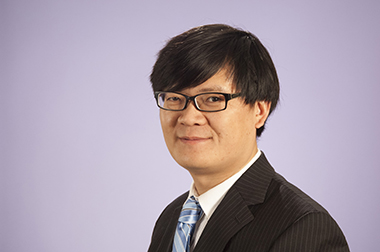Seeking Patterns in Big Data
Computer Scientist Feng Chen selected for prestigious NSF CAREER Award
 |
|
Assistant Professor of Computer Science Feng Chen
|
ALBANY, N.Y. (April 10, 2018) — As technology advances, the massive amount of data generated continues to increase faster than our ability to analyze it. This is the puzzle that Assistant Professor Feng Chen grapples with: We can improve the ability of different information systems to interact, but can we find a way to understand the avalanche of information produced in a coherent way?
Chen has been awarded a prestigious National Science Foundation (NSF) CAREER grant to do just that: develop a unified, theoretical framework for discovering complex patterns in big data in a multitude of tasks.
“Recent advances in sensing and computing techniques have led to a need for massive quantities of data to be aggregated from various information sources in fields such as science, engineering, and business that are naturally modeled in the form of big attributed networks,” said Chen, an assistant professor of Computer Science at the College of Engineering and Applied Sciences.
Big attributed networks (BANs) are ever-present in the modern world, with social media, computer networks, biological networks and enterprise systems among well-known examples. Different from traditional networks that are represented by nodes and links, BANs have the additional rich set of features on the nodes and/or edges. Effective analysis of BAN data relies on the simultaneous sparse feature selection and subgraph mining. However, as yet little has been done to bridge these two important research areas. This is where Chen’s research comes in.
“The focus of our project is therefore to unify a wide range of complex pattern discovery tasks and to resolve the fundamental modeling, algorithmic, and interactive challenges associated with ubiquitous BAN data in today's big data era,” said Chen.
The research could benefit, for example, in the detection and forecasting of societal events (disasters, civil unrest), anomalous patterns (disease outbreaks, cyberattacks), discriminative subnetworks (cancer diagnosis), knowledge patterns (new knowledge building) or storylines (intelligence analysis).
“Consider a situation in which a large amount of live disease surveillance network data is collected from heterogeneous information sources such as hospitals, drug stores and Twitter feeds,” said Chen. “Given the availability of a disease surveillance network, public health practitioners in a city or a state would be able to identify at an early stage whether an outbreak event is occurring, what type of outbreak is present (characterized by a subset of attributes), and which areas have been infected (characterized by subgraphs), which would enable a timely and effective public health response.”
Among Chen’s goals for the project is the development of interdisciplinary courses on topics such as complex pattern detection in BAN data presented at seminars, tutorials and workshops. Similar to previous CAREER award winners at UAlbany, plans are also underway to advance educational opportunities for K-12 students in the Capital Region in the form of a big data analytics summer camp.
Chen’s project is entitled “SPARK: A Theoretical Framework for Discovering Complex Patterns in Big Attributed Networks.”
Chen is now the third recipient of a CAREER Award at the College of Engineering and Applied Sciences. He joins associate professors of Computer Science Siwei Lyu (2010) and Jeong-Hyon Hwang (2012) as recipients of the highly competitive CAREER Award.
Lyu’s CAREER Award to develop new methods to detect altered or faked digital images has led to additional funding through the National Science Foundation.
Hwang’s NSF CAREER award was used in the development of G*, a system capable of compressing dynamic graph data based on commonalities among the graphs in the series for “deduplicated” storage on multiple servers.
"We are extremely proud of Dr. Chen’s prestigious CAREER Award, already the third for the College of Engineering and Applied Sciences," said Kim Boyer, Dean of CEAS. "Drs. Chen, Lyu, and Hwang are developing international reputations as scholars of the first rank; they represent the new tradition of excellence we are building in the College of Engineering and Applied Sciences at the University at Albany."
Chen graduated from the Discovery Analytics Center (DAC) at Virginia Tech with a Ph.D. in computer science in 2012, and then worked as a postdoctoral researcher in the Event and Pattern Detection Laboratory and the iLab at Carnegie Mellon University, before he joined UAlbany in 2014.
The Faculty Early Career Development (CAREER) Program offers the National Science Foundation's most prestigious awards in support of the early career-development activities of teacher-scholars who most effectively integrate research and education in their work. The awards support a select group of junior faculty across the nation who exhibit exceptional promise for combining outstanding research with excellent teaching.
![]() For more news, subscribe to UAlbany's RSS headline feeds
For more news, subscribe to UAlbany's RSS headline feeds
A comprehensive public research university, the University at Albany-SUNY offers more than 120 undergraduate majors and minors and 125 master's, doctoral and graduate certificate programs. UAlbany is a leader among all New York State colleges and universities in such diverse fields as atmospheric and environmental sciences, business, education, public health,health sciences, criminal justice, emergency preparedness, engineering and applied sciences, informatics, public administration, social welfare and sociology, taught by an extensive roster of faculty experts. It also offers expanded academic and research opportunities for students through an affiliation with Albany Law School. With a curriculum enhanced by 600 study-abroad opportunities, UAlbany launches great careers.


